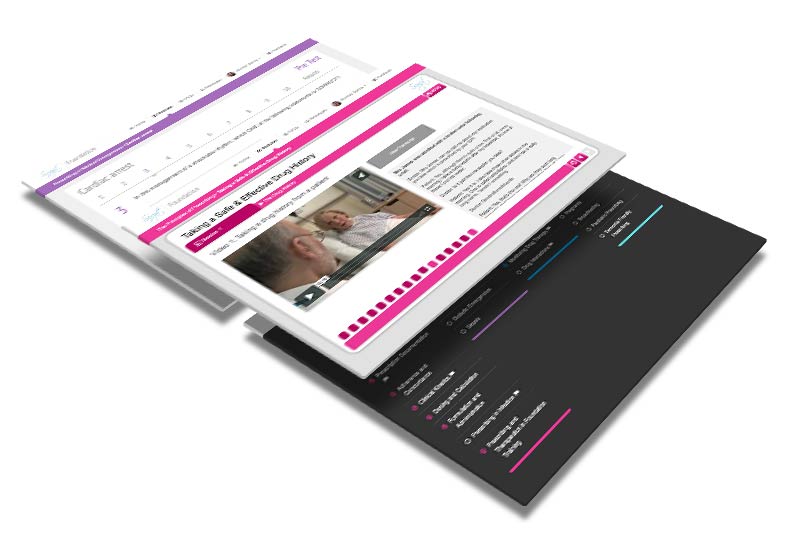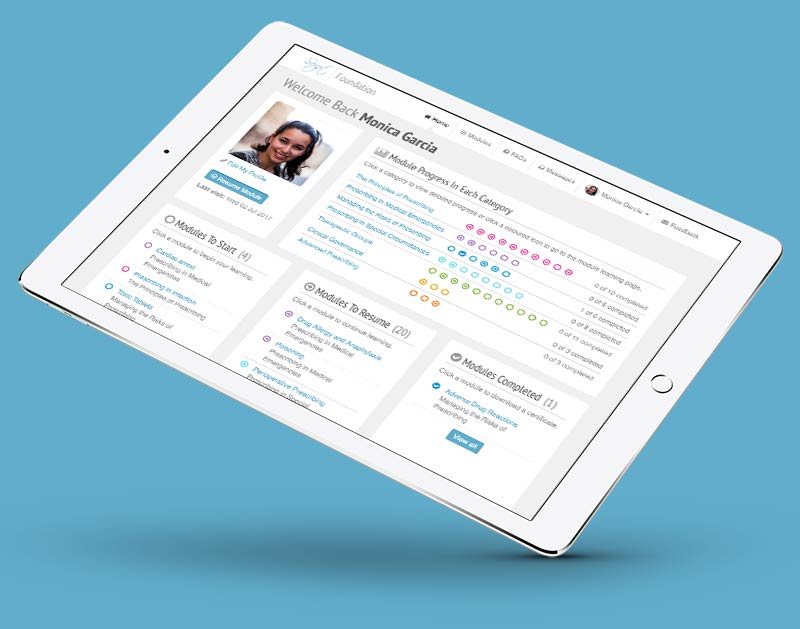Medicine & Surgery
eLearning to prepare for effective and appropriate prescribing practiceConsisting of 47 modules covering a range of therapeutic topics and aligns with GMC guidance on safe prescribing and medical education.


Introduction
Medicine & Surgery SCRIPT is an eLearning programme, which aims to improve prescribing competency and safety among trainee doctors. It is now being used by all Foundation Schools in England.
In 2009, the EQUIP study commissioned by the GMC found that trainee doctors prescribe with an error rate of 8-10%. In response, Health Education England (West Midlands team) commissioned SCRIPT. It was developed by the Universities of Birmingham, Aston and Warwick, and OCB Media Ltd.
Each module takes around 30 – 60 minutes to complete. All course materials have been authored by a team of expert healthcare professionals, and are regularly reviewed and updated.

Why use SCRIPT?
Safer prescribing
SCRIPT enhances trainees’ knowledge and confidence in prescribing correctly, improving patient safety.
Professional development
Certificates are made available on completion of a module, which can be used for online learning portfolios as evidence of continuing professional development.
Flexibility
SCRIPT is easily accessible and intuitive to use, allowing users to complete modules at their convenience and refer back to modules at any time during their training.
Great customer service
The SCRIPT team offer technical and editorial support for both users and educational supervisors.
Quality assured
SCRIPT aligns with GMC guidance on safe prescribing and all modules are authored and regularly reviewed by expert healthcare professionals.
Features
Interactive Content
Accessible Modules
Pre and Post-Tests
Certificates
Support
Expert Content
Up-to-date Modules
Testimonials
Relevance to Practice
Frameworks
- General Medical Council
Aligns with GMC Standards in ‘Promoting excellence: standards for medical education and training’ (2015) - Health Education England
Recommended as a key educational strategy in Health Education England report on ‘Combating antimicrobial resistance’ (2017)
Awards
- Patient Safety Awards 2013
Winner of Improving Safety in Medicine Management category
(Foundation SCRIPT) - Patient Safety Awards 2013
Finalist in Education and Training category
(Foundation SCRIPT) - BMJ Improving Health Awards 2012
Finalist: Excellence in Healthcare Education
(Foundation SCRIPT)
Used across the UK
by Foundation Schools in the following regions…
- West Midlands
- East Midlands
- East of England
- Kent, Surrey & Sussex
- North Central & East London
- North East
- North West
- North West London
- South London
- South West
- Thames Valley
- Wessex
- Yorkshire and Humber
- Northern Ireland
- Wales
Learning Content
47 modules in 7 categories
Principles of Prescribing
- Prescription Documentation
- Prescribing and Therapeutics in Foundation Training
- Fundamentals of Pharmacology
- Taking a Safe and Effective Drug History
- Adherence and Concordance
- Clinical Kinetics
- Dosing and Calculation
- Formulation and Administration
- Prescribing in Infection
- Utilising the BNF(C)
Managing the Risks of Prescribing
- Adverse Drug Reactions
- Medication Errors
- Monitoring Drug Therapy
- Drug Interactions
- Toxic Tablets
- Parenteral Poisons
Therapeutic Groups
- Respiratory Medicine
- Diabetes
- Psychiatric Symptom Management in General Hospital Settings
- Anticoagulation
- Infection in Secondary Care
- Management of Pain
- Heart Failure
- Cardiac Dysrhythmias
- Epilepsy
- Drugs of Misuse
- Rheumatology
Advanced Prescribing
- Prescribing at the Interface and Team Prescribing
- Managing Complications of Anticancer Therapies
- Palliative and End-of-Life Care
Prescribing in Medical Emergencies
- Drug Allergy and Anaphylaxis
- Poisoning
- Cardiac Arrest
- Fluids
- Diabetic Emergencies
- Sepsis
Prescribing in Special Circumstances
- Perioperative Prescribing
- Prescribing in Hepatic Dysfunction
- Prescribing in Renal Dysfunction
- Prescribing in Older Adults
- Prescribing in Pregnancy
- Prescribing in Breastfeeding
- Paediatric Prescribing
- Dementia Friendly Prescribing
Clinical Governance
- Rational Drug Choice
- Root Cause Analysis




